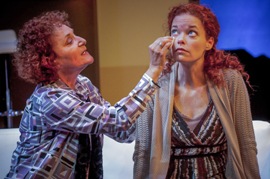
Jon Robin Baitz’s Other Desert Cities, one of the best written, most thought-provoking, and ultimately most moving plays of the last decade, now arrives at Long Beach’s International City Theatre in a production that no lover of contemporary drama will want to miss.
Taking as its theme the continental divide that has polarized America into mud-slinging camps of liberals vs. conservatives over the past few decades, the 2012 Best Play Tony nominee gives that culture gap a decidedly personal, familial note.
 It is Christmas morning 2004, and rather than head sensibly on down the highway to the “other Desert Cities” beyond Palm Springs, adult siblings Brooke and Trip Wyeth (Ann Noble and Blake Anthony Edwards) have agreed to spend the holidays with their parents Polly and Lyman (Suzanne Ford and Nicholas Hormann), the kind of folks who find Donald Rumsfeld’s visit to the troops in Baghdad “a nice thoughtful Christmas present.”
It is Christmas morning 2004, and rather than head sensibly on down the highway to the “other Desert Cities” beyond Palm Springs, adult siblings Brooke and Trip Wyeth (Ann Noble and Blake Anthony Edwards) have agreed to spend the holidays with their parents Polly and Lyman (Suzanne Ford and Nicholas Hormann), the kind of folks who find Donald Rumsfeld’s visit to the troops in Baghdad “a nice thoughtful Christmas present.”
Brooke has ventured Out West from Long Island, where she earns a modest living writing articles for magazines like Gourmet and Travel & Leisure. Making her first visit “home” in six years, she has only recently recovered from years of debilitating depression, years during which Lyman and Polly watched helplessly as their daughter succumbed deeper and deeper into her personal darkness.
Raised the daughter of Hollywood semi-royalty, Brooke sees her movie-star-turned-GOP-chair-turned-ambassador father as having “sold out” by trading in his B-movie-stardom for right-wing politics, a move that Lyman prefers to dub “a higher calling.” (Not surprisingly, the Wyeths have counted Ron and Nancy Reagan among their closest friends.)
While Brooke went off to pursue a career in writing on the East Coast, her “ADD-riddled, junk-food-addicted, porn-surfing little brother” Trip has followed in his parents’ Hollywood footsteps, creating the hit TV show Jury Of Your Peers, a People’s Court-type reality program featuring real litigants, a retired judge (from Encino no less), and a jury made up, not of regular folks like you and I, but of actual, honest-to-goodness stars (or as Polly puts it, “some very moth-eaten, down-on-their-luck has-beens.”)
 Though Brooke’s visit home might, on the surface, seem merely a long-postponed holiday reunion, she has brought along her soon-to-be-published manuscript, not the second novel her parents have assumed her to be writing, but a family memoir penned in an attempt to find answers to her many questions about Henry, the older brother “whom we can’t talk about,” who “went to war with our parents, joined a cult, disappeared, and then planted a bomb in an army recruiting center, before killing himself.”
Though Brooke’s visit home might, on the surface, seem merely a long-postponed holiday reunion, she has brought along her soon-to-be-published manuscript, not the second novel her parents have assumed her to be writing, but a family memoir penned in an attempt to find answers to her many questions about Henry, the older brother “whom we can’t talk about,” who “went to war with our parents, joined a cult, disappeared, and then planted a bomb in an army recruiting center, before killing himself.”
Polly sees it somewhat differently, viewing Henry’s death as the untimely end of a son who “was implicated in a horrific, senseless bombing in which a homeless veteran of Vietnam was burnt to death.” According to Mom, if Henry was at all implicated in the events which drove him to suicide, it was the drugs he was taking that were at fault, and not herself, Lyman, or the golden boy who was her first-born child.
Unable to stop from obsessing about why her brother and best friend jumped off a ferry into freezing water, choosing to leave his parents a note while ignoring his beloved sister in his final moments, Brooke has written her memoir as a way of getting the facts out into the open, her belief in truth-at-any-cost once again putting her at odds with her parents’ (and particularly Polly’s) insistence upon privacy-by-all-means.
Completing the cast of characters is Polly’s recovering alcoholic sister Silda (Eileen T’Kaye), with whom Polly co-wrote “the Hillary movies,” a hit film series now available in a boxed DVD set stretching from Here Comes Hillary to the series finale Hasta La Vista Hillary, the latter entirely penned by Silda during a feud with her sister. At long last reconciled, or at least for the time being, Polly and Silda have declared a cease-fire, though whether it will last beyond this Christmas season is anyone’s guess.
Playwright Baitz keeps Act One packed with smart, snappy one-liners that might lead unsuspecting theatergoers to think what they’re seeing is a comedy. For instance, describing her five-years-sober sister Silda, Polly quips, “The woman’s liver needs a liver,” a one-liner that would do Neil Simon proud.
If all there were in Other Desert Cities were its first act, Baitz would still have written tellingly about parents and their grown children of opposing political beliefs as he did on Brothers And Sisters. Like the TV series’ Walker clan, Other Desert Cities’ Wyeths are fully fleshed out, speak with intelligence and wit, and defy easy pigeonholing.
It’s Baitz’s second act that elevates Other Desert Cities from first-rate dramedy to contemporary classic, as secrets are uncovered, truths turn out to be lies, and characters we’ve thought we’ve pegged end up surprising us in ways we would never have expected.
Like the previous International City Theatre hits Red, Ghost-Writer, and God Of Carnage, ICT’s latest benefits enormously from the incisive, nuanced direction of Artistic Director caryn desai. (The play’s closing tableau is a particularly powerful desai inspiration, but not the only one.)
 As for the cast brought together for this production, it is hard to imagine a finer ensemble of actors on any Los Angeles-area stage.
As for the cast brought together for this production, it is hard to imagine a finer ensemble of actors on any Los Angeles-area stage.
Noble is quite simply superb as the angry, hurt, resentful Brooke, a seething caldron of repressed rage whose discoveries over the course of a single day allow the Antaeus Company staple to dig deep, reveal oceans, and deliver her finest performance since 2006’s Orange Flower Water.
Not only do Ford’s brittle, impeccably dressed-and-groomed Polly and Hormann’s strong-silent-type Lyman look like they could have stepped off the cover of Palm Springs Life, they embody to perfection the couple’s irreproachable manners, carefully cultivated poise, and overall Ronnie-Nancy dynamic. The longtime stage-and-screen vets have done outstanding work before. Here they are both downright sensational, and never more so than when Act Two allows masks to fall.
An excellent Edwards gives us a Trip whose addictions to junk food and pot may have begun to take their toll, but whose unconditional love remains strong, even as it finds him torn between parents and sibling and longing for a family peace that seems illusive at best.
 Last but not least is recovering alcoholic Silda, whom the fabulous T’Kaye gives a deliciously acerbic edge meant to hide the anger and resentments that the L.A. theater favorite ever so subtly lets slip through.
Last but not least is recovering alcoholic Silda, whom the fabulous T’Kaye gives a deliciously acerbic edge meant to hide the anger and resentments that the L.A. theater favorite ever so subtly lets slip through.
Scenic designer JR Bruce’s Lyman family home reveals both its elegant “desert cities ambiance” and the lives of the couple who have lived there for so long, a design enhanced by resident property designers Patty, Gordon, and Christopher Briles’ impeccable props and Debra Garcia Lockwood’s subtly effective lighting. Resident costume designer Kim DeShazo once again merits high marks for creating attire that reflects the personalities and style of each character, as do the styles created by resident hair and wig designer Anthony Gagliardi. Resident sound designer Dave Mickey provides his own invaluable contributions to the production as well.
Henry “Heno” Fernandez is production stage manager and Anne L. Hitt assistant stage manager. Michael Donovan, CSA is resident casting director and Richie Ferris casting assistant.
I’ve seen Baitz’s multiple-Tony nominee twice previously, each production offering its own insights into one of the finest plays of recent years. Other Desert Cities’ latest incarnation provides as engrossing and rewarding an evening of drama as I’ve had the pleasure to enjoy on the International City Theatre stage.
International City Theatre, Long Beach Performing Arts Center, 300 E. Ocean Blvd., Long Beach.
www.InternationalCityTheatre.org
–Steven Stanley
June 6, 2014
Photos: Suzanne Mapes
Tags: International City Theatre, Jon Robin Baitz, Los Angeles Theater Review, Other Desert Cities


 Since 2007, Steven Stanley's StageSceneLA.com has spotlighted the best in Southern California theater via reviews, interviews, and its annual StageSceneLA Scenies.
Since 2007, Steven Stanley's StageSceneLA.com has spotlighted the best in Southern California theater via reviews, interviews, and its annual StageSceneLA Scenies.







 COPYRIGHT 2025 STEVEN STANLEY :: DESIGN BY
COPYRIGHT 2025 STEVEN STANLEY :: DESIGN BY